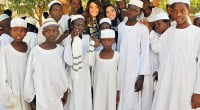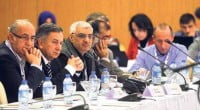Future’s continent and African renaissance

Date posted: July 3, 2013
Over the last three days since Friday, the issues and the glamorous developments of the African continent have been discussed in a hotel along the magnificent Abant Lake.
In addition to experts on Africa from Turkey, academics, journalists and statesmen from different countries on this continent have made presentations and discussed a number of issues relevant to Africa. The Abant Platform, affiliated with the Journalists and Writers Foundation, has once again reminded all of the need for Turkey to stay focused on developments in the near and remote abroad despite unpleasant developments in respect to the settlement process of the Kurdish issue and to Gezi Park.
Africa, the largest and the second most populous continent in the world, makes up 6 percent of the total surface area of the planet and 24.4 percent of the total land with its area of 32.2-million-square-kilometers. The continent, which also has 15 percent of the world’s population (1 billion people), has 54 independent states. Despite huge socio-cultural and economic differences and remarkable demographic diversity, Africa is viewed by some who take a simplistic approach as if it is a single political entity, and African intellectuals now object to this. Displaying huge differences from the north to the south and from the east to the west, Africa needs to be properly understood and recognized by countries like Turkey, which are trying to enhance their relations with the countries of the continent.
The African countries that were colonialized by the European colonialist powers in the 19th century are now trying to deal with the impacts of this traumatic invasion that lasted 100-150 years. Knowing that there were only two independent states, Ethiopia and Liberia, on this huge continent during those dark and unfortunate years indicates the inhumane acts by European powers in Africa. At the 1884-1885 Berlin Conference convened with the participation of the dominant powers of Europe in Africa, the Europeans ended their colonization activities in Africa and started a full partition.
It took a century for the African countries to get rid of this brutality, invasion and plunder. The struggle of the African countries for independence continued through the 1950s and 1960s; after this struggle, all colonies became at least officially independent. The withdrawal of Portugal from the Sub-Saharan Africa took place as late as 1975. Rhodesia, which unilaterally gained its independence from Britain in 1965, was recognized as Zimbabwe in 1980 only after the removal of the white minority regime by the guerilla warfare of black people. The apartheid regime in South Africa remained up until 1994.
Most of the 54 independent states in Africa are administered by presidential system; and unfortunately, the democratization process in a number of states has been interrupted by military coups, juntas and military dictatorships. Military juntas are in power in most of these countries, causing instability. On the African continent where more than 70 coups were staged in the period between 1960 and 1980 alone, 13 leaders were also assassinated. The arbitrary borders drawn by the European colonialists are now causing serious clashes and problems between many countries on the continent.
One of the destructive wars of this kind took place in Congo in 2008; according to estimates, 5.4 million people were killed in this war. War crimes and crimes against humanity have been committed in the war in Darfur since 2003, while 800,000 people were massacred in the genocide in Rwanda in 1994. The clashes and wars led to instability and to many other problems. In particular, AIDS has become the most important issue that the region has had to deal with.
Luckily, the clashes and wars in the continent tended to diminish in the 2000s. For instance, the 30-year-long domestic war in Angola ended in 2002. After achievement of stability, a liberal economy was introduced, and this attracted the attention of investors to the continent. There are now many countries such as China that have made huge investments in Africa. The African economies are now ranked among the fastest-growing economies in the world. The revolutionary developments in the communication field strengthened the interaction between the world and the African continent; as a result, positive reflections were observed in the economic and social fields.
However, despite all these positive developments and the fact that Africa is one of the richest continents in terms of raw materials in the world, most African countries are the least developed and poorest countries in the world: 25 African countries are included on lists in UN human rights reports as the countries suffering from the worst conditions; this explains the reason for the underdevelopment on the continent despite huge resources. Despite its remarkable natural sources, 80 percent of the people who live under the hunger threshold — $1.25 a day — are in sub-Saharan Africa, according to a report by the World Bank published in 2008.
Despite this negative outlook, the average annual economic growth in Africa has been over 5 percent since 1995. In particular, oil-rich countries such as Angola, Sudan and Equatorial Guinea have displayed higher economic growth rates. It is known that the African countries, which have 90 percent of the cobalt and plating reserves, 50 percent of the gold reserves, 98 percent of the chromite reserves, 70 percent of the tantalite reserves, 64 percent of the manganese reserves and two-thirds of the uranium reserves in the world, are now prone to economic development and human development. For instance, the Democratic Republic of Congo has 70 percent of the coltan minerals, extensively used in the manufacturing of cell phones, and 30 percent of the diamond reserves in the world; it is therefore expected that thanks to these resources, this country will make huge contributions to the economic development of the continent.
However, despite these resources, the growth of agricultural and manufacturing in Africa has not improved at the anticipated rate. This could be attributed to the global economic crisis and to the uncontrolled, fast population growth of the countries on the continent. In some African countries whose population has grown at significant levels since independence, more than half of the population is under the age of 25. The population of the continent increased from 221 million in the 1950s to 1 billion people today.
Currently, one-third of African countries are ruled by democracy; and African countries have displayed an economic growth over the last five years that is higher than the world average; this indicates that despite negative indicators, the continent appears able to deal with its misfortune. As economic welfare increases, the quality of human capital also improves; thanks to this, a virtuous cycle that could lead to abundance is replacing the depressive atmosphere of a vicious cycle that has negatively affected the continent for centuries. Just holding this indicator in mind will give a hint as to the potential development of African countries: The number of college graduates in the Democratic Republic of Congo when it gained its independence was five; today, however, 35,000 students are enrolled in Kinshasa University alone.
In addition, the positive outcomes of education institutions sponsored by civil society organizations like the Hizmet Movement, which has no ulterior motives or colonial ambitions, will be surely observed in the near future. Knowing that there are 16 Turkish schools, a big university founded by the Hizmet Movement and a full capacity hospital in Nigeria alone will suffice for us to believe that there are strong reasons to become hopeful for a happy and prosperous future for our brothers in Africa.
In fact, today, the African countries and peoples know their problems better. However, everybody has a duty to support them to ensure that they use their huge resources to overcome these problems and issues. The people of the African continent — who cannot be regarded as poor considering the huge sources they have — are, unfortunately, suffering from serious poverty. Everybody has a responsibility to lend support to efforts to deal with this poverty and to the African renaissance that these peoples have been going through. Those who hold this responsibility sincerely will surely have a place in Africa, which is on a march to become the continent of the future.
Source: TodaysZaman, 30 June, 2013
Author: BÜLENT KENEŞ
Source: TodaysZaman , 30 June, 2013
Tags: Abant platform | Africa |
























